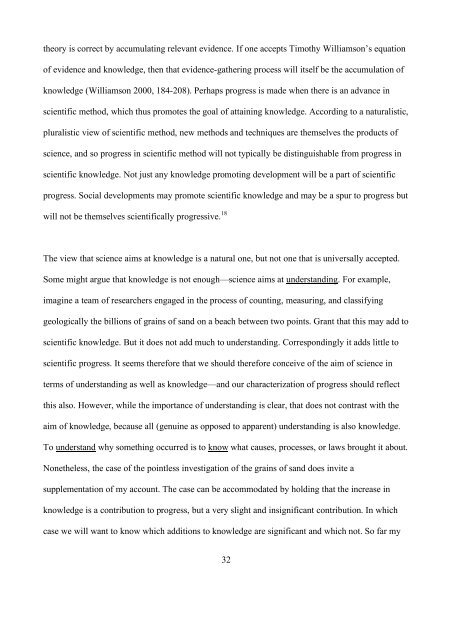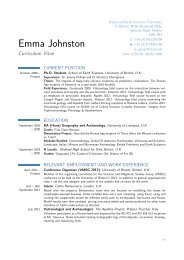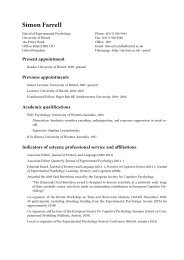What is Scientific Progress?
What is Scientific Progress?
What is Scientific Progress?
Create successful ePaper yourself
Turn your PDF publications into a flip-book with our unique Google optimized e-Paper software.
theory <strong>is</strong> correct by accumulating relevant evidence. If one accepts Timothy Williamson’s equation<br />
of evidence and knowledge, then that evidence-gathering process will itself be the accumulation of<br />
knowledge (Williamson 2000, 184-208). Perhaps progress <strong>is</strong> made when there <strong>is</strong> an advance in<br />
scientific method, which thus promotes the goal of attaining knowledge. According to a natural<strong>is</strong>tic,<br />
plural<strong>is</strong>tic view of scientific method, new methods and techniques are themselves the products of<br />
science, and so progress in scientific method will not typically be d<strong>is</strong>tingu<strong>is</strong>hable from progress in<br />
scientific knowledge. Not just any knowledge promoting development will be a part of scientific<br />
progress. Social developments may promote scientific knowledge and may be a spur to progress but<br />
will not be themselves scientifically progressive. 18<br />
The view that science aims at knowledge <strong>is</strong> a natural one, but not one that <strong>is</strong> universally accepted.<br />
Some might argue that knowledge <strong>is</strong> not enough—science aims at understanding. For example,<br />
imagine a team of researchers engaged in the process of counting, measuring, and classifying<br />
geologically the billions of grains of sand on a beach between two points. Grant that th<strong>is</strong> may add to<br />
scientific knowledge. But it does not add much to understanding. Correspondingly it adds little to<br />
scientific progress. It seems therefore that we should therefore conceive of the aim of science in<br />
terms of understanding as well as knowledge—and our characterization of progress should reflect<br />
th<strong>is</strong> also. However, while the importance of understanding <strong>is</strong> clear, that does not contrast with the<br />
aim of knowledge, because all (genuine as opposed to apparent) understanding <strong>is</strong> also knowledge.<br />
To understand why something occurred <strong>is</strong> to know what causes, processes, or laws brought it about.<br />
Nonetheless, the case of the pointless investigation of the grains of sand does invite a<br />
supplementation of my account. The case can be accommodated by holding that the increase in<br />
knowledge <strong>is</strong> a contribution to progress, but a very slight and insignificant contribution. In which<br />
case we will want to know which additions to knowledge are significant and which not. So far my<br />
32






